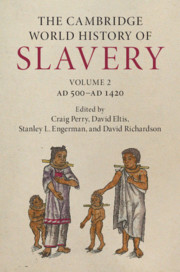Book contents
- The Cambridge World History of Slavery
- The Cambridge World History of Slavery
- The Cambridge World History of Slavery
- Copyright page
- Contents
- Figures
- Contributors
- Chapter 1 Slavery in the Medieval Millennium
- Part I Captivity and the Slave Trade
- Part II Race, Sex, and Everyday Life
- Part III East and South Asia
- Chapter 11 Slavery in Medieval China
- Chapter 12 Slavery in Medieval Korea
- Chapter 13 Slavery and Dependency in Medieval South India
- Part IV The Islamic World
- Part V Africa, the Americas, and Europe
- Index
- References
Chapter 13 - Slavery and Dependency in Medieval South India
from Part III - East and South Asia
Published online by Cambridge University Press: 09 September 2021
- The Cambridge World History of Slavery
- The Cambridge World History of Slavery
- The Cambridge World History of Slavery
- Copyright page
- Contents
- Figures
- Contributors
- Chapter 1 Slavery in the Medieval Millennium
- Part I Captivity and the Slave Trade
- Part II Race, Sex, and Everyday Life
- Part III East and South Asia
- Chapter 11 Slavery in Medieval China
- Chapter 12 Slavery in Medieval Korea
- Chapter 13 Slavery and Dependency in Medieval South India
- Part IV The Islamic World
- Part V Africa, the Americas, and Europe
- Index
- References
Summary
This chapter considers South India, in the period of 500-1500 CE, focusing particularly on the region that is today Tamilnadu. Based primarily on the evidence of stone inscriptions, as well as religious literature composed in Tamil, it argues that slavery must be understood within the framework of a large and complex system of dependency and hierarchy. Virtually all members of society – whether attached to the land or land-owners, or part of the “households” of Hindu temples or royal courts – were bound into relationship of dependency. These relationships were not systematized and caste identities and hierarchies were not fixed. Categories of persons evidently of “lowly” status, such as the paraiyar, might in some cases have been enslaved agricultural laborers but also appear in the inscriptions as temple patrons. Women who were sold to temples were assigned menial domestic duties but sometimes also performed high-status ritual services. The social reality of servitude and slavery in medieval South India, especially in connection with what was probably the extensive use of slaves in rice cultivation (from the 13th century onward), is only hinted at in the inscriptional sources, and in Hindu religious literature was transformed into an idiom of devotion.
- Type
- Chapter
- Information
- The Cambridge World History of Slavery , pp. 313 - 334Publisher: Cambridge University PressPrint publication year: 2021
References
Primary Sources
Secondary Sources
- 1
- Cited by

